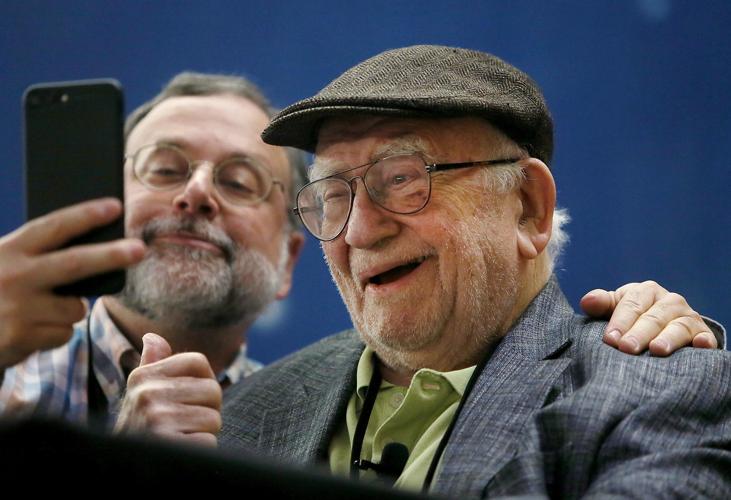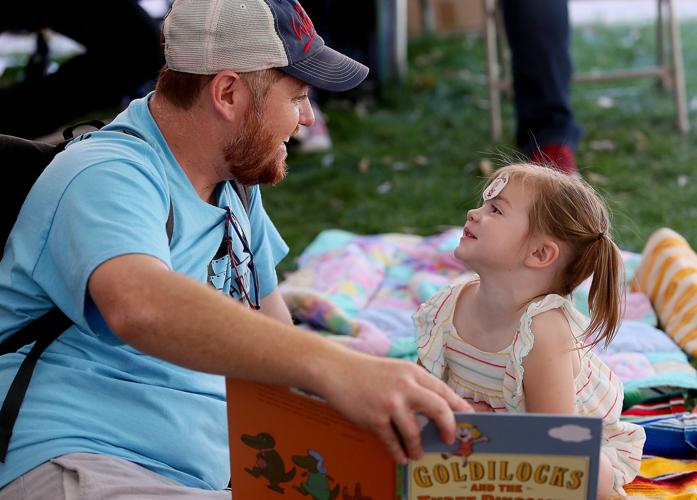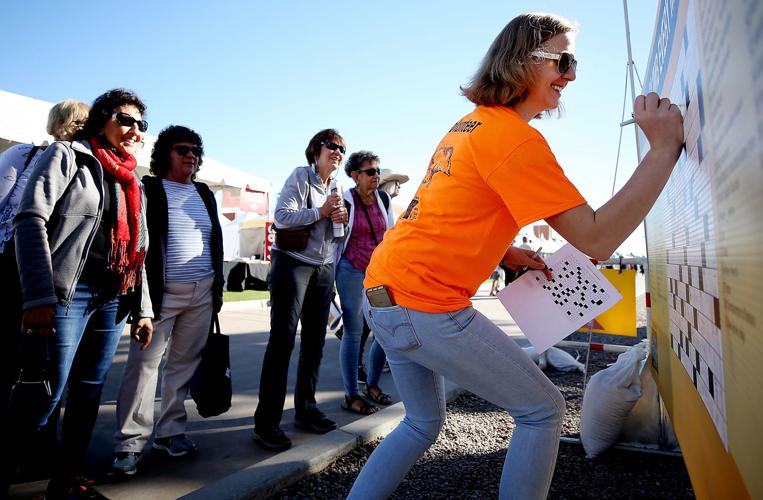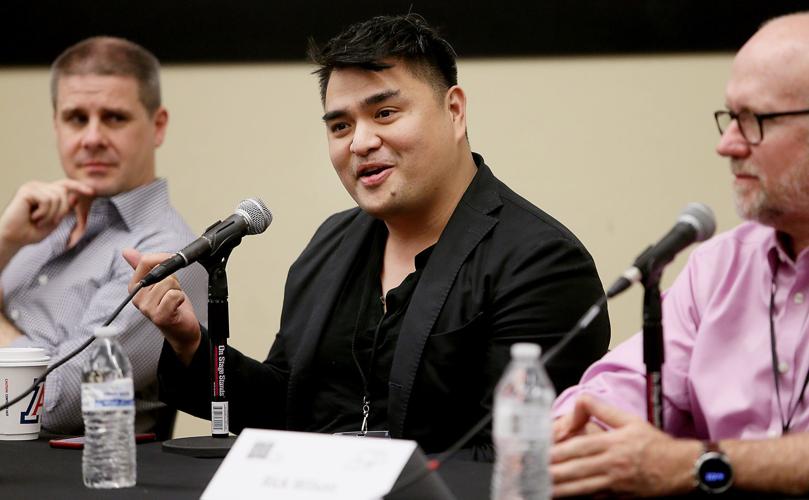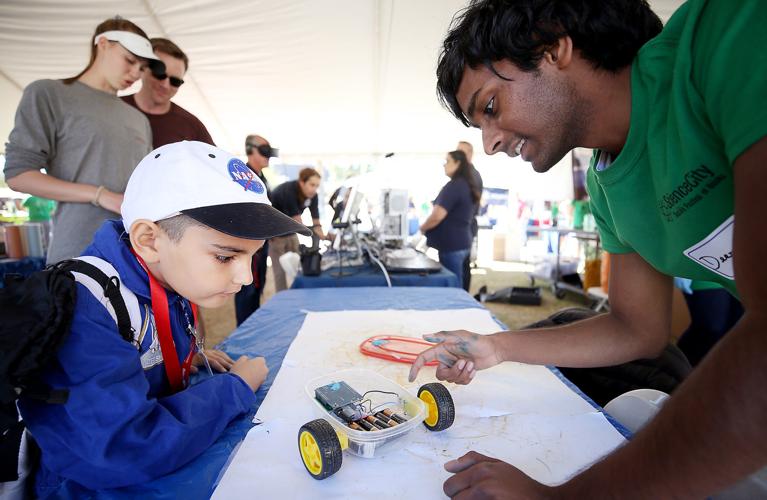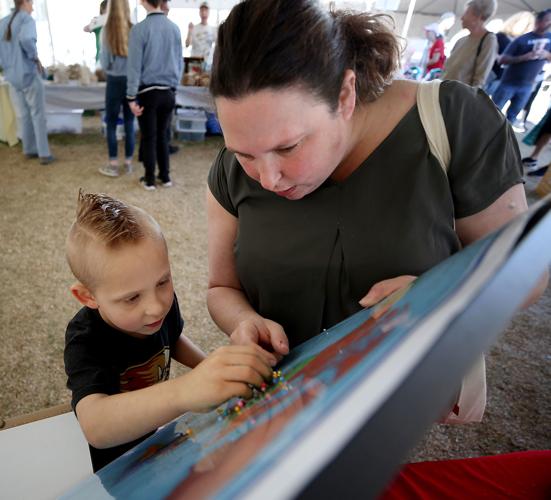Author Dave Cullen chronicles the remarkable first year of the Never Again/March for Our Lives movement in his new book ŌĆ£Parkland.ŌĆØ He told a Tucson Festival of Books audience Sunday that its young leaders figure it will take a generation, as it did for civil rights, for their movement to truly change America.
The next generation is already listening.
Nine-year-old Matheo Richman of Tucson waited patiently after CullenŌĆÖs talk, while the author was interviewed live on C-SPAN Book TV to a national audience from the prestigious festival on the University of Arizona campus.
Then Matheo got his attention to tell him Emma and David and all the other Parkland teens are his heroes.
ŌĆ£Oh, cool!ŌĆØ Cullen responded, and asked to take a selfie with him to show Emma Gonzalez, David Hogg and the rest.
People are also reading…
Matheo lost a cousin in the Sandy Hook school shooting, he explained.
Avielle Richman.
She was 6.
Sandy Hook, the 2012 massacre in Newtown, Connecticut ŌĆö ŌĆ£thatŌĆÖs the one everyone thought was going to change things,ŌĆØ Cullen had noted in his talk earlier Sunday afternoon, ŌĆ£because itŌĆÖs 6-year-olds, cŌĆÖmon!ŌĆØ
But itŌĆÖs not the level of horror or outrage that begins a movement toward change, said Cullen.
By the time the Parkland high school shooting came around on ValentineŌĆÖs Day last year, there was pent-up anger ŌĆö ŌĆ£the candle was there to be lit.ŌĆØ
ŌĆ£The No. 1 thing is the messenger,ŌĆØ he said. ŌĆ£It had to be the kids. And those Sandy Hook kids were too young to speak for themselves.ŌĆØ
ŌĆ£The Parkland kids changed the game by being the messengers themselves.ŌĆØ
ŌĆ£Healing me ... healing AmericaŌĆØ
Emotion overcame Cullen quickly and suddenly as he spoke at UAŌĆÖs Gallagher Theater in one of the closing sessions of this weekendŌĆÖs 11th annual Tucson festival, the third-largest such book event in the country.
He had opened by acknowledging TucsonŌĆÖs mass shooting of Jan. 8, 2011.
ŌĆ£I am sorry you have to be one of the communities hit by this, that you are on the list that keeps growing ridiculously longer. Now when we say Aurora, we have to say which one,ŌĆØ he said, incredulous. ŌĆ£There are so goddamned many of these.ŌĆØ
Two decades ago, Cullen, a journalist, was among the first to arrive on the scene at Columbine High, as the carnage there launched the modern era of school lockdowns and terror. He wrote a definitive account in the New York Times bestseller ŌĆ£Columbine,ŌĆØ and became a nationally known expert on school shootings.
And then, a bout of secondary PTSD ŌĆ£knocked me down,ŌĆØ followed by a ŌĆ£daunting and terrifyingŌĆØ relapse.
ŌĆ£The killers donŌĆÖt get inside me,ŌĆØ he said. ŌĆ£I thought that would be the darkest part of writing the book. For me, itŌĆÖs the survivors, and just getting to know them.ŌĆØ
He swore he would never plunge back into the aftermath. But by noon the day after the Parkland shooting, after HoggŌĆÖs activism had already begun on TV news and in social media, Cullen was writing a piece for Politico: Is this time really different?
So he went, and when he arrived at the park in Florida where memorials were sprouting, he saw 17 angels, lit up, representing the students who died.
ŌĆ£My legs actually gave out, and I was kneeling on the ground, sobbing, instantly,ŌĆØ Cullen told the Tucson audience, his eyes suddenly red and teary, his words catching in his throat. ŌĆ£I sobbed it out for 10 minutes.ŌĆØ
ŌĆ£But then, meeting and talking with these kids ŌĆö they healed me.
ŌĆ£I feel like the kids are healing America. And taking us somewhere.ŌĆØ
ŌĆ£Not about a shooting; about a way outŌĆØ
ŌĆ£Here is a sentence you would not expect in a review of a book on one of the countryŌĆÖs most notorious school shootings: ŌĆśParklandŌĆÖ by Dave Cullen is one of the most uplifting books you will read all year,ŌĆØ the Washington Post wrote.
ŌĆ£I didnŌĆÖt do a book about a shooting,ŌĆØ Cullen said. ŌĆ£I did a book about a reaction to a shooting, and a possible way out.
ŌĆ£And I am hopeful.ŌĆØ
His book takes readers inside the family homes ŌĆö it was usually the living room of Cameron Kasky, ŌĆ£the bubbliest person on earthŌĆØ ŌĆö where these talented suburban teens pooled their strengths, drawn from their theater, campus journalism or student government backgrounds, and strategized their uprising.
They had urgency and they are brilliant at speaking to their generation through social media. They made lots of wise, firm decisions early on ŌĆö to be bipartisan because ŌĆ£if itŌĆÖs just a red-blue thing, weŌĆÖre screwed.ŌĆØ To give everyone in the group equal voice and veto power. To emphasize that some of their own parents were law enforcement officers and gun owners and that they arenŌĆÖt against the Second Amendment. To reach out to, train with and merge with urban students of color who faced daily gun violence in Chicago and other cities.
They also ŌĆ£spent a lot of time with Gabby and Mark,ŌĆØ meaning Tucson mass shooting survivor Gabrielle Giffords and her husband Mark Kelly.
Hogg is ŌĆ£the angry young manŌĆØ who began filming his fellow students and documenting the shootingŌĆÖs immediate aftermath while they were still in lockdown, because if he was going to die, he was going to show and shame America, Cullen said ŌĆö drawing applause from the book festival audience.
Gonzalez is the galvanizing star, a mesmerizing face of the movement.
Behind the scenes, Jackie Corin is the practical, detail-oriented organizer who got the permission slips gathered, etc., so buses of student advocates could roll.
ŌĆ£Jackie is a presence, but with a tiny little voice so she stood on a chairŌĆØ to be heard, Cullen said. ŌĆ£SheŌĆÖs got it going on, and she became kind of the hero of the book.ŌĆØ
And Matt Deitsch is the political strategist, who helped them decide to take their summer bus tour into ŌĆ£gun country, red states and red districts to engage more people in the conversation,ŌĆØ and to focus on the 2018 midterm elections.
ŌĆ£And they have the vast majority on their side,ŌĆØ Cullen said. In almost all polls on the issue, he said, more than 90 percent of Americans agree on universal background checks for gun sales.
ŌĆ£Gun owners, too,ŌĆØ he added. ŌĆ£They love their children, too, and theyŌĆÖre afraid to send them to kindergarten.ŌĆØ
ŌĆ£The NRA, by playing a bullying game and making gun safety a toxic issue politically, isnŌĆÖt speaking for their own membership,ŌĆØ Cullen said.
ŌĆ£How do we get the majority of Americans to meet somewhere in the middle,ŌĆØ where their hearts really are, he asked? ŌĆ£Everyone is afraid to take a step toward there, because the NRA wonŌĆÖt give an inch. No one trusts each other even to go a step toward the middle.ŌĆØ
But the Parkland leaders have had ŌĆ£an amazing first year,ŌĆØ he said.
He gives them credit for increasing the percentage of voters under age 30 who turned out in the midterms; for the fact that their side outspent the NRA; for helping to flip the House; and that ŌĆ£for the first time in the exit polling, gun safety made the list.ŌĆØ
He also pointed to Democrat Nancy Pelosi, ŌĆ£who announced on Day 1ŌĆØ after the midterms that her party would bring up gun regulation legislation, ŌĆ£a complete reversal.ŌĆØ
ŌĆ£Her party had been hiding and running on this issue for a generation,ŌĆØ Cullen said, because Republicans and the NRA ŌĆ£would always use it against them.ŌĆØ
ŌĆ£That really tells you everything, that the kids had an impact.
ŌĆ£Gun safety is now an issue thatŌĆÖs a political winner, rather than a loser.ŌĆØ
They did have a lot of sad, ŌĆ£crappy daysŌĆØ along the way, and some breakdowns, ŌĆ£but when they hit the wall, they found a way over it.ŌĆØ
ŌĆ£It wasnŌĆÖt a magic act. They arenŌĆÖt Joan of Arc. TheyŌĆÖre just normal kids.
ŌĆ£Just go for it,ŌĆØ he advised others who want to keep their movement going.
Matheo Richman is among them.


